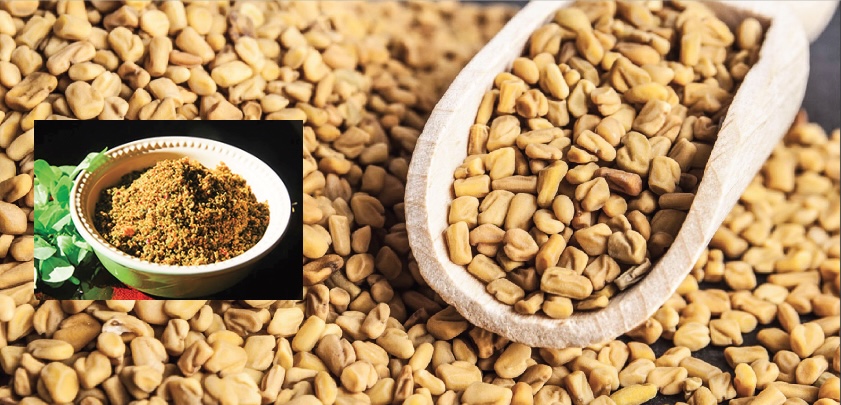For thousands of years fenugreek and its seeds have wielded their powers on our plates, our palettes and in nature’s home pharmacies
By Lakshmi Sridharan
Though little known in the west, fenugreek—called methi in India—has a three-thousand-year history of medicinal use in Egypt, southern Europe, India, Asia and northern Africa. Its medicinal value is noted in ancient writings such as the papyri found in Egyptian tombs and the records of the Roman emperor Charlemagne.
Fenugreek (Trigonella foenum graecum) also called Bird’s Foot, Bockshornklee, and Greek Hayseed, is indigenous to North Africa, the Middle East, Morocco, and eastern Mediterranean countries. It is widely cultivated in India, Egypt and the Far East. Even in cold-winter areas it can be grown during spring and summer.
It is a member of the pea family, growing approximately two feet high with small trifoliate leaves. Tiny yellowish aromatic seeds are enclosed within sickle-shaped pods. The seeds are rich in nutrients, and high in protein content (about 22%), dietary fiber (about 48%) and mucilage (25%). It is a good source of minerals—phosphorus, magnesium, calcium and iron in easily absorbable form, and selenium; vitamins thiamin, niacin, riboflavin, vitamins A, E and C, and amino acids such as isoleucine, 4-hydroxyisoleucine, histidine, leucine, lysine, l-tryptophan, and arginine. The seeds also contain a huge number of biotherapeutic compounds, including asterpenoids, alkaloids, flavonoids and phenolics.
Time-Proven Medicinal Uses
Among the six tastes classification in ayurveda, methi falls in the bitter category, which plays an important role in balancing out pitta and kapha doshas—the heat and fluid humors in our constitution. Ayurvedic, Unani and Chinese medicine all use fenugreek seeds and leaves for treating a wide variety of ailments, including allergies, bronchitis, diabetes, dyspepsia, edema in leg, emphysema, fever, flatulence, flu, high cholesterol, hypertension, kidney problems, and more. Its potent anti-inflammatory action helps fight a whole spectrum of ills cause by inflammation. Fenugreek seeds are widely used for female issues: menstrual cramps, childbirth pain and cervical cancer. Taken as food, methi promotes lactation in nursing mothers.
Modern Scientific Verification
Several modern scientific animal and human clinical trials have confirmed the therapeutic applications of fenugreek seeds.
Oils in the seeds and several antimicrobial compounds in the leaves have demonstrated toxicity to bacteria, parasites and fungi. Fenugreek seed sprouts have increased antioxidant profile and antimicrobial activity against Helicopbacter pylori (H-pylori), the cause of most stomach ulcers. Fenugreek strongly inhibits the growth of Staphylococcus aureus and Pseudomonus aeruginosa in a petri dish. Leaf extracts have shown antifungal properties.
In vitro studies of essential oils from fenugreek have demonstrated antimicrobial activity against five bacteria—Proteus, Escherichia coli, Staphylococcus aureus, Pseudomonas aeruginosa and Klebsiella pneumoniae, and one yeast—Candida albicans. A 2008 Oxford Journals article reported on in vitro studies showed fenugreek extracts to be effective against resistant strains of the malaria-causing parasite Plasmodium.
Health Enhancement
Fenugreek absorbs and eliminates toxins and aids excretion of fecal bile acid and cholesterol. Because of its anti-inflammatory properties, it is used to treat peptic ulcers and inflamed conditions of the stomach and bowel. The seed extract is rich in mucilage, acting as a lubricant and forming a protective, healing coating over inflamed areas. Fenugreek reduces the level of calcium oxalate, the causative agent for kidney stones. It lowers LDL (bad) and elevates HDL (good) cholesterol, lowers triglyceride levels andenhances overall health by cleaning the lymphatic system. The lymph carries nutrients and removes toxic wastes, dead cells and trapped proteins. A blocked lymphatic system can mean poor circulation, fluid retention, pain, loss of energy and disease.
Several research studies have demonstrated the therapeutic potential of fenugreek seed extracts in treating diabetes. Fenugreek helps maintain healthy blood sugar levels, and clinical studies have demonstrated its hypoglycemic effects on type I and II diabetics. In vitro studies have demonstrated its stimulation of pancreatic x-cells.
As an antioxidant, fenugreek is anti-carcinogenic. Several laboratories are investigating its value in the prevention and control of cancer. Fenugreek seed extract demonstrated 70% inhibition of tumor-cell growth in mice, compared with controls. The phytochemicals in the seed extract have been shown to inhibit human leukemia HL-60 cells and cell proliferation in the human osteo sarcoma. Fenugreek seed extract has been shown to decrease the incidence of breast cancer. In animal studies, fenugreek appeared to protect against colon cancer.
Everyday Use
“Food is medicine” is the slogan of the day. Replacing junk foods in your diet with healthful, high-nutrient foods can keep many diseases at bay. Drink fenugreek-seed tea to relieve symptoms of irritable bowel syndrome, colitis and diverticulitis. A gargle made from the seeds does wonders for ordinary sore throat. Drink a glass of diluted buttermilk with a teaspoon of fenugreek powder to promote digestion. Sprout the seeds for salads and sandwiches, or roast them in a skillet on low heat for a minute or two, grind to a fine powder and store in an airtight container. Grow the herb and enjoy the fresh leaves. Or simply use Indian curry powder, which contains fenugreek in addition to many other healthful spices. Google “fenugreek recipe” for a wealth of delicious recipes.
Cautions
Fenugreek in its natural form is safe and beneficial for most people. Be cautious, however, if you are considering taking it in supplement form. Food supplements usually have high concentrations of phytochemicals and should always be used with caution. If you have food allergies, be aware that fenugreek may cause allergic reactions, such as facial swelling, breathing difficulty and fainting. Individuals allergic to peanuts or garbanzo beans may need to avoid fenugreek altogether. Do not use it if you have bleeding problems or are using blood thinners, as it may increase the risk of bleeding.
Remembering that moderation is the key to success, enjoy the many beneficial effects of fenugreek by incorporating this delicious, time-tested and well-loved herb and spice into your diet.
